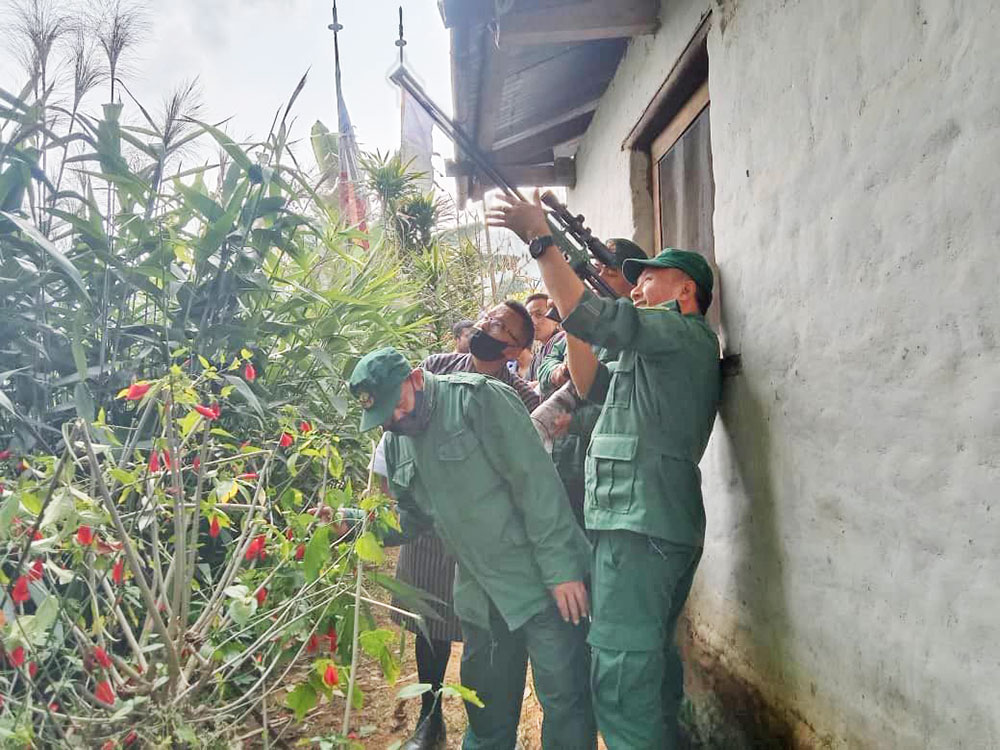Several sightings in the capital city unusual, says foresters
Chhimi Dema and Choki Wangmo
The sighting of a bear, or its photos and videos shared on social media platforms, always makes for a good joke, but the frequent visits from the black furry beast is raising some concerns.
The increased sightings of several Himalayan Black bears have alerted authorities to warn people, especially joggers and early risers, to be aware of bears both in the dzongkhag and in the capital city.
The latest sighting was on December 4 when a bear broke into a shed at Lungtenphu to feed on vegetables stored there. Forestry officials dismantled a section of the shed, and made a hole to shoot a tranquiliser dart. The bear was then safely relocated above Hongtsho.

Foresters warn people to avoid early morning and evening walks
Although there are no cases of bears attacking the capital’s residents, Thimphu forest division Chief Forestry Officer Gyeltshen Drukpa said sightings of wild animals near settlements have been unusual this year.
In Thimphu, bears were sighted in Serbithang, upper Motithang, Taba, Chamjaykha, Tango, and Cheri. The closest was at Lungtenphu and one in Babesa although the Babesa incident was not reported. A few weeks ago, foresters found a dead bear in Serbithang and another in Jimena.
Bears forage for food as they prepare to hibernate during the winter months. Forestry officials attribute global warming and waste as probable reasons for bears coming closer to human settlements.
Bears have a great sense of smell and can smell objects from a distance of 30 kilometres away, said the chief forestry officer. “Because people do not manage their degradable waste, the bears get drawn to the waste.”
Gyeltshen Drukpa also said that with warmer days, bears keep on feeding and delay their hibernation.
Senior forestry officer with the Nature Conservation Division, Namgay Wangchuk, also attributes the increased sightings to food sources, including kitchen waste, that are available around the settlements.
He said that because the bears are about to hibernate they risk coming closer to human settlements in search of food.
Another reason, he said, is the wild animals lack a fear of humans. “When people enter their habitat and take forest resources, they get used to the presence of people and lose their fear,” he said.
A study, Circumstances of Human Conflicts With Bears and Patterns of Bear Maul Injuries in Bhutan, shows that between 2015 and 2019, there were 34 cases of bear attacks treated at the Jigme Dorji Wangchuck National Referral Hospital.
Tsirang forestry officials warn people to be wary of bears
Forestry officials in Tsirang are warning people to avoid going into forested areas alone, particularly in the mornings and evenings after recent incidents of bear attacks.
Last month, a Himalayan Black bear mauled a man in the Patshaling-Maed chiwog when he went to collect fodder near his home. Residents said that the encounter was the first of its kind in the chiwog.
Doonglagang residents also reported sightings in many chiwogs. They said that the animal was not only a menace to humans but also attacked their livestock.
“It has been risky to move around,” one said.
In Mendrelgang gewog, according to the residents, bear sightings happen often. One resident said that bears roamed freely along the Mendrelgang-Damphu road, posing risks to commuters.
Reserboo residents reported several instances of bear sightings in their village.
In October, forest officials rescued a male Himalayan black bear from the village. The animal was found to be feeding on colocasia species and sugarcane adjoining the human settlement, posing threat to the public in Reserboo village.
The injured animal was taken to the Sarpang Wildlife Rescue and Rehabilitation Centre for further management and treatment.
Last month, a female Himalayan Black bear was also rescued from near a house in Tashicholing chiwog in Phuentenchu. The bear, according to the Tsirang forestry division, is expected to be relocated to a nearby forest with the same habitat conditions.
The dzongkhag administration asked the public in their Facebook post to be extra vigilant and avoid walking alone, using a picture of a massive bear, which is not from Tsirang.


